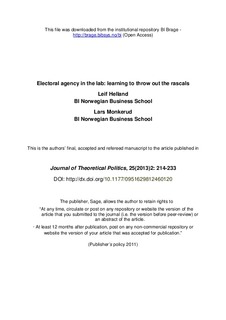Electoral agency in the lab: learning to throw out the rascals
Journal article, Peer reviewed
Permanent lenke
http://hdl.handle.net/11250/93784Utgivelsesdato
2013Metadata
Vis full innførselSamlinger
- Scientific articles [2181]
Originalversjon
10.1177/0951629812460120Sammendrag
Models of electoral agency address the levels of discipline and selection that voters can acheive in elections. The models are demanding in terms of individual belief-formation and consistency of behavior. We investigate a baseline model of electoral agency in a controlled laboratory environment. This baseline model, although simple, forms the central plank of more complex electoral agency models. Our design seeks to limit the behavioral impact of social preferences. We nd little support for the baseline model in our data. However, simple (nonrational) learning rules explain behavioral patterns well. Simulations indicate that non-rational learning drives behavior most forcefully towards equilibrium in situations that are favorable to Bayesian
updating.
Beskrivelse
This is the authors’ final, accepted and refereed manuscript to the article
